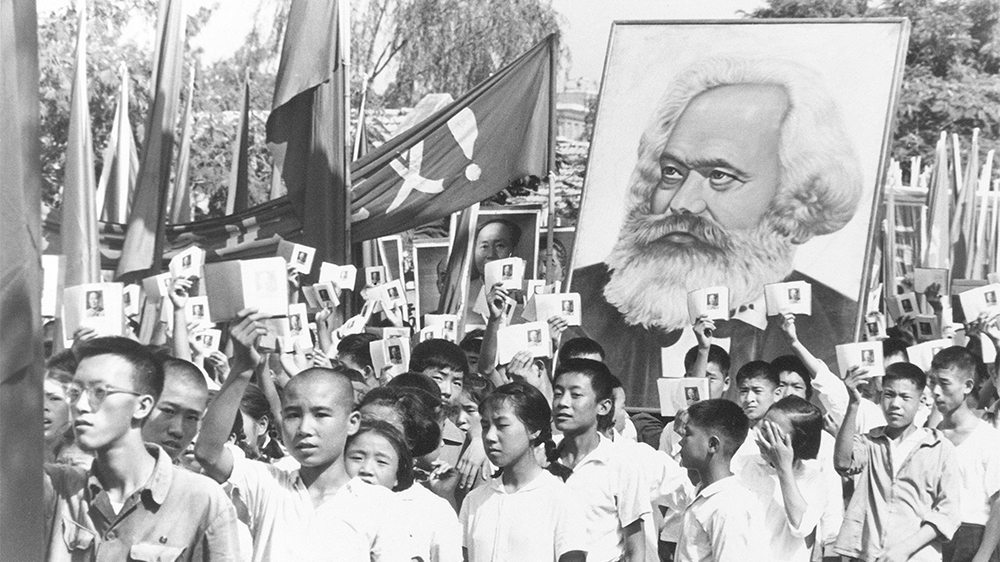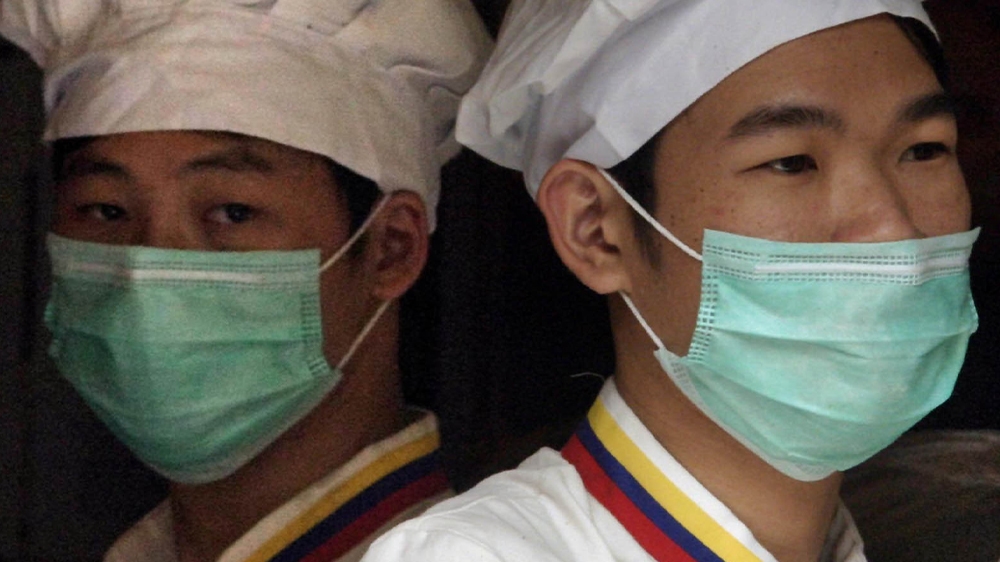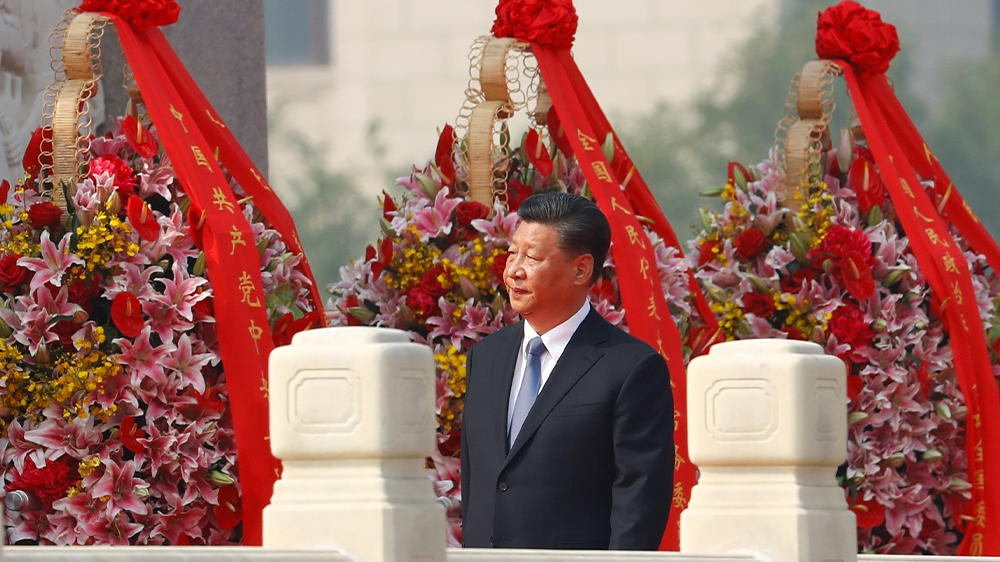People’s Republic of China: From Mao to now
Key events from the past 70 years – from the foundation of the People’s Republic in 1949 to the present day.

Beijing marks 70 years of the People’s Republic of China on October 1 with a military parade that will showcase the country’s latest weaponry.
Rehearsals have been going on for weeks, but the people of Beijing will have to watch the invitation-only event on television.
The China of 2019 is very different from the one that existed at the end of the civil war when Communist forces under Mao Zedong defeated the nationalists of Chiang Kai-shek, who retreated to Taiwan in 1949.
Back then the average life expectancy was just 35 years and the average per-capita income for its half billion people was equivalent to $54.
Now China’s population is more than a billion, it’s the world’s second-largest economy and average per-capita income is $10,000. Life expectancy has more than doubled to 77 years.
Here are the major events of the past 70 years:
1 October, 1949
Victorious after 20 years of civil war, Mao Zedong proclaims the new People’s Republic of China, declaring: “The Chinese people have stood up.”

1950
Mao begins a enormous programme of economic and social reconstruction, but just as the economy shows signs of recovery, China intervenes in the Korean War on the side of North Korea.
Chinese forces march into Tibet, which is incorporated into the People’s Republic of China. After a failed uprising in 1959, Tibetans’ spiritual leader, the Dalai Lama, flees to India where he sets up a government-in-exile.
1958
Mao launches the “Great Leap Forward”, a five-year economic plan aimed at super-charging industrial and agricultural production to catch up with more advanced nations. As markets are disrupted and production plummets, the policy leads to a devastating famine.
1960-61
Two years of famine resulting from the disastrous policies of the Great Leap Forward lead to the deaths of at least 45 million people.
1964
The ‘Little Red Book’ – a collection of Mao’s quotations and thoughts – and formally titled “The Quotations of Chairman Mao” is published for the first time. The Ministry of Culture aims to ensure every citizen has a copy.
China explodes its first atom bomb.

1966
Mao and his wife, Jiang Qing, launch the Cultural Revolution – an effort to revive revolutionary fervour and rid the party of supposedly “bourgeois” elements. Mao’s Red Guard units, dominated by teenagers and students, pledge the “destruction of the four olds” (ideas, culture, habits and customs).
Over the next 10 years, China endures enormous social and political upheaval as tens of thousands suspected of following “the capitalist road” are killed and millions forced into manual labour.
1971
The PRC (People’s Republic of China) replaces Taiwan, known officially as the Republic of China at the United Nations. The Taiwan delegation walks out of the UN to spare themselves further humiliation as the vote to “expel forthwith the representatives of Chiang Kai-shek from the place which they unlawfully occupy at the UN and in all the organisations related to it” passes 76 to 35 with 17 abstentions.
1972
US President Richard Nixon makes a landmark visit to China and expresses willingness to forge diplomatic relations with the PRC.
1976
Prime Minister Zhou Enlai dies in January and Mao on September 9 unleashing a power struggle within the party.
Mao’s widow and three of her colleagues – the so-called “Gang of Four” – are arrested and convicted of crimes against the state.
The city of Tangshan is devastated by an earthquake that kills nearly 300,000 people.

1977
Deng Xiaoping emerges as the dominant figure in the party leadership and begins far-reaching economic reforms.
1979
Beijing and Washington establish full diplomatic relations.
1980
The government introduces the One-Child Policy in an effort to slow population growth and raise living standards.
1986
China’s “open-door policy” begins, opening the country to foreign investment and encouraging the development of a market economy and private sector.
The phrase “to get rich is glorious” is widely attributed to Deng Xiaoping, although it is unclear if he ever actually said it.
1989
Amid an ideological struggle within the ruling party, thousands of demonstrators – mostly students and workers – descend on Tiananmen Square in May, taking over the square and calling for democratic reforms.
On June 3, the government orders the military to clear the protesters. Officially 200 people are killed. The unofficial death tolls put the number closer to 3,000.
International outrage leads to sanctions against China.

1992
Russia and China formally end more than 30 years of enmity, signing a declaration to restore friendly ties.
1993
Jiang Zemin becomes president while hardliner Li Peng – seen as the main advocate behind the 1989 Tiananmen crackdown – is returned for another five-year term as prime minister.
Work begins on the Three Gorges Dam – a project first envisaged by Mao as a way to control the annual flooding of the Yangtze and generate electricity.
1997
Deng Xiaoping dies, aged 92.
Hong Kong is returned to Chinese rule, after more than a century as a British colony. China promises to ensure freedoms unseen on the mainland for the people of Hong Kong, for at least 50 years.
1999
The Falun Gong spiritual group is banned as a threat to stability.
The Portuguese colonial territory of Macau reverts to Chinese rule, ending five centuries of colonialism in China.
2001
China joins the World Trade Organization, ending a 15-year debate over whether it is entitled to the full trading rights of capitalist countries.
2002
Hu Jintao becomes head of the Communist Party, replacing Jiang Zemin, the outgoing president, at the start of a two-year handover of power.

2003
An outbreak of the previously unknown Severe Acute Respiratory Syndrome (SARS) virus kills 774 people, mostly in Hong Kong and mainland China.
China becomes only the third country in the world – after Russia and the US – to send a human into space. Yang Liwei orbits the Earth 14 times on board the Shenzhou V spacecraft.
2006
Structural work is completed on the Three Gorges Dam, the largest in the world. More than 1.3 million people were forced from their homes for the 17-year construction of the dam with whole towns relocated.
2008
Anti-China protests erupt in Tibet and spread to Tibetan communities in nearby provinces. The protests are the most serious uprising against Chinese rule in 20 years.
In May, a 7.9 magnitude earthquake strikes the southwestern province of Sichuan, leaving nearly 90,000 people dead or missing, including thousands of children who were trapped in the rubble when their schools collapsed.
In July, China hosts the Olympic Games for the first time. The Bird’s Nest stadium in Beijing, designed especially for the event was the work of artist Ai Wei Wei and the Swiss architects Herzog de Meuron.

2010
China officially overtakes Japan as the world’s second-biggest economy.
Jailed writer and democracy advocate Liu Xiaobo is awarded the Nobel Peace Prize, triggering angry protests from Beijing. He dies of advanced liver cancer in July 2017, two weeks after being given medical parole.
His wife Liu Xia was kept under house arrest and was eventually allowed to leave for Germany in July 2018.
2011
Internationally renowned artist and activist Ai Wei Wei is arrested and later charged with tax offences. He later moves to Europe.
2013
Xi Jinping takes office as China’s president.
2014
Protesters occupy Hong Kong’s city centre for 79 days calling on China to honour its commitments to democracy in the semi-autonomous city.
2016
The Two-Child Policy comes into effect on January 1.
2017
Beijing carries out mass detention of Muslim Uighurs in the country’s Xinjiang province. Conservatives estimates put the number of ethnic Uighurs – and other Muslim minorities held under some form of detention between one and 1.5 million.
2018
A constitutional change removes the two-term time limit on the presidency, allowing Xi to stay in office beyond 2023. His name and ideology are also added to the party’s constitution, putting him on the same level as party founder Chairman Mao.
2019
Plans for an extradition bill that allows people in Hong Kong to be sent to the mainland for trial bring millions onto the streets in peaceful protests in June.
The city’s government eventually agrees to recall the bill, but by then the demonstrations have morphed into bigger demands for more democratic freedoms.
